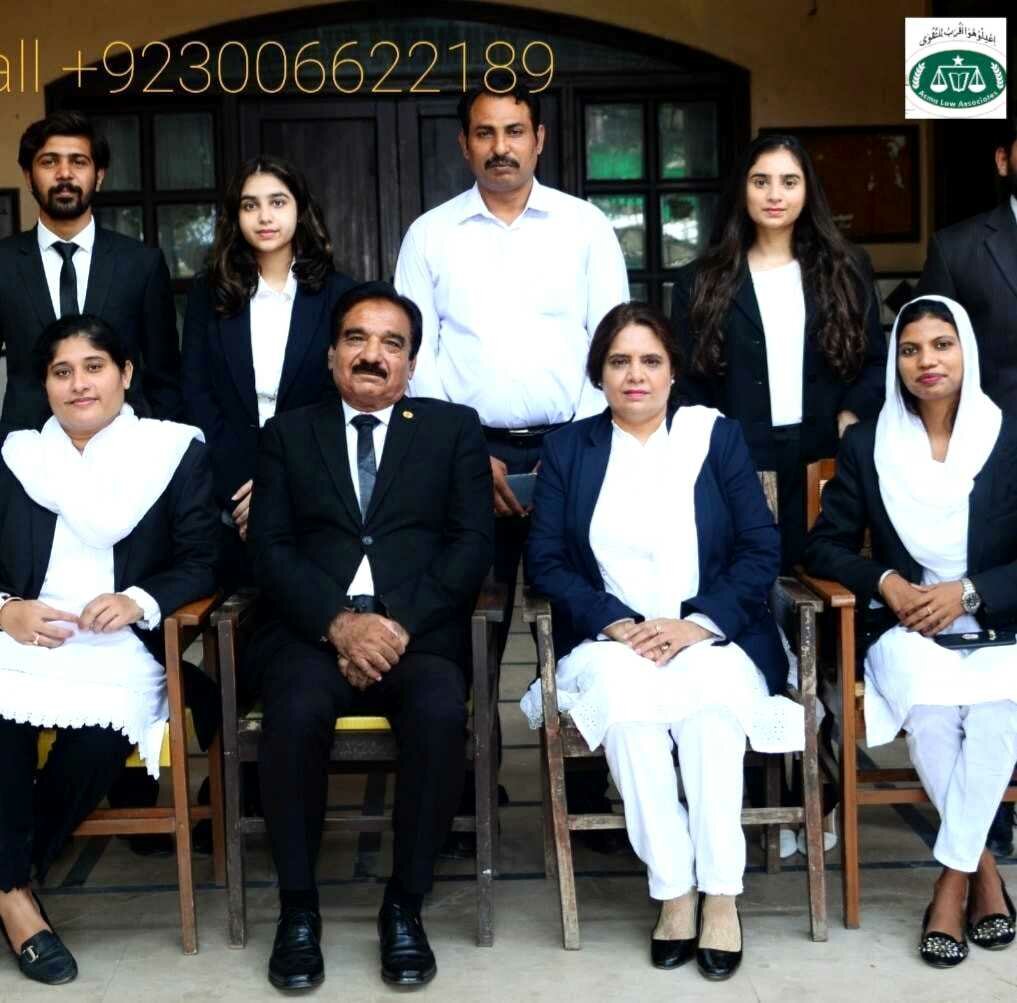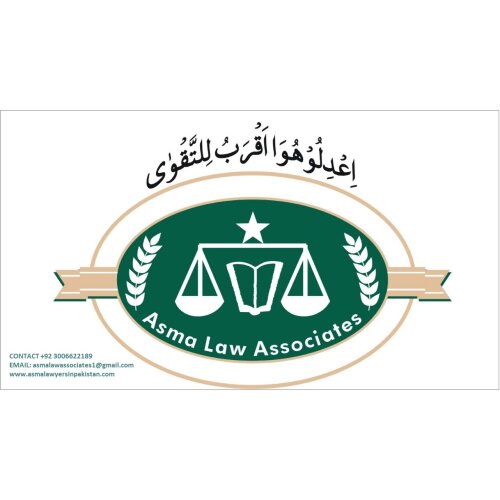
Legal Services Offered
Family & Personal Law
- Family Matters: Court marriage, divorce (including Christian, Shia, Sunni divorces), custody of children, khula, dower, dowry, maintenance, protection for women against harassment and domestic violence, and forced marriage.
- Legal Certificates: Succession certificate, guardianship certificate, unmarried certificate, probate of will, death certificate, birth certificate registration (via NADRA and Union Councils).
- Child Matters: Custody and visitation disputes, guardianship, adoption, permission to take minors abroad, and recovery of minor children.
- NICOP & Passport Issues: Multiple passports, exit control list (ECL) matters, name inclusion/removal from police character certificates or blacklists.
Property Law
- All kinds of property disputes: Transfer, power of attorney (including registration for overseas Pakistanis), court stay, declaration, injunction, probate, succession, inheritance, joint property, auction, attachment, loans and liens, sale, revenue records, computerized fard, property tax, and contract deeds.
- Property Transactions: Rent agreements, agreements to sell, stamp papers, letters of credit, lease agreements, and registration in Civil Court and High Court.
- Share in parent property (in case of mother or father’s death).
Criminal & Cyber Law
- Criminal Matters: Bail, removal of name from police records, FIR registration, and court representation.
- Cyber Crimes: Internet fraud, hacking, online scams, identity theft, cyberbullying, stalking, defamation, blackmailing via social media (e.g., Facebook), and FIA court proceedings in Faisalabad and Lahore.
- Ponzi schemes fraud. NCCIA (National Cyber Crime Investigation Agency).
Corporate & Intellectual Property
- Company Law: Formation and registration of companies, industrial design, intellectual property, copyrights, domain names, patents, licensing law, trade secrets, and trademarks.
Legal Documentation & Notarization
- Deed writing, notarization, sale/purchase deeds, lease deeds, wills, rent/mortgage agreements, redemption, affidavits, undertakings, surrender deeds, memorandums, power of attorney drafting, and adoption deeds.
Labor, Service & Tax Matters
- Labor court matters, wage commissioner cases, government department disputes.
- Service-related issues: Termination stay, back benefits, Federal Service Tribunal matters.
- FBR-related legal services: Tax return filing, NTN, STNR registration, customs issues, withholding tax, import/export, and property tax issues.
Consumer Protection
- Cases in District Consumer Courts and stay against utility companies (e.g., WAPDA for overcharging or billing issues).
Banking & Finance
- Legal services related to personal loans, mortgages, car or house installment issues, redemptions, and banking litigation.
Other Services
- Arms license assistance (including verification, permit, succession certificate).
- International driving license processing.
- Immigration and citizenship services: Green card, asylum, naturalization, visa, work permits, extradition.
- Private detective services for embassies.
- Sports contract legal services, tourism and travel legal assistance.
About Asma Tanveer Randhawa Advocate
Founded in 2004
7 people in their team
Practice areas
Languages spoken
Free • Anonymous • Expert Lawyers
Need Personal Legal Help?
Connect with experienced lawyers in your area for personalized advice on your specific situation.
No obligation to hire. 100% free service.
Practice areas
Notary Services
Case results
Procedure of Court Marriage. What are the requirement of court marriage in Pakistan? What is the difference between nikkah and court marriage? How to do Nikkah in Pakistani court? Age Limit of court marriage in Pakistan? Procedure of Online Court Marriage
Divorce & Separation
Please contact us on 00923006622189 to get opinion as per your independent matter.
Procedure of Court marriage online nikkah in Pakistan
Marriage
Procedure of Court Marriage in Pakistan – A Complete Guide
Court marriage in Pakistan is a legal and streamlined process for couples who choose to marry without traditional ceremonies. Whether for personal preference, inter-caste or inter-faith unions, or simply for legal recognition, court marriage offers an efficient and legitimate way to formalize a relationship under Pakistani law. Below is a comprehensive guide covering the requirements, process, and key differences between Nikkah and court marriage.
What is Court Marriage?
Court marriage in Pakistan is a civil marriage conducted in the presence of a Marriage Registrar and solemnized under the Muslim Family Laws Ordinance, 1961. It involves legal formalities such as obtaining consent, verifying age, and documenting the union without the need for elaborate religious ceremonies.
Requirements for Court Marriage in Pakistan
To proceed with court marriage, both individuals must fulfill the following criteria:
Age: The male must be at least 18 years old, and the female must be at least 16 years old (as per Islamic law, though some courts may require both to be 18 due to child marriage laws in certain provinces).
Free Will: Both parties must consent to the marriage without coercion.
Mental Capacity: Both individuals must be of sound mind.
Identity Documents: CNICs (Computerized National Identity Cards) or B-forms and copies are required.
Two Witnesses: Preferably adult male Muslims, although females and non-Muslims can also be witnesses under the law.
Affidavit of Free Will: Usually provided by the bride to confirm the marriage is by her choice.
Difference Between Nikkah and Court Marriage
| Nikkah | Court Marriage |
|---|---|
| Religious ceremony under Islamic traditions | Legal procedure conducted in court or by a marriage registrar |
| Often held at a mosque or home with family involvement | Typically occurs in a registrar's office or court |
| Requires a Nikkah Khawan (Imam) | Can be solemnized by a registered Nikkah Registrar |
| May or may not be registered legally | Always involves legal registration and documentation |
| Cultural practices often included | Simple and legally focused |
Note: Court marriage includes Nikkah, but within a formal legal structure. So, a court marriage is a Nikkah conducted under legal supervision and registered immediately.
How to Do Nikkah in Pakistani Court?
Contact a Lawyer or Registrar: Seek assistance from a legal professional or directly approach a licensed Nikkah registrar.
Prepare Documentation: CNICs, passport-sized photos, and an affidavit of free will (especially for the bride).
Nikkah Ceremony: A Nikkah Khawan conducts the ceremony in court or at the registrar’s office.
Sign Marriage Certificate: Both parties, witnesses, and the Nikkah registrar sign the Nikahnama.
Registration: The marriage is registered with the local Union Council.
Age Limit for Court Marriage in Pakistan
Male: Minimum age is 18 years
Female: Minimum age is 16 years, though some provinces (like Sindh) have raised it to 18 under child marriage laws.
Always check the specific requirements of your province to avoid legal complications.
Procedure of Online Court Marriage in Pakistan
Online court marriage is a modern solution for couples separated by distance or residing abroad. Here's how it works:
Legal Consultation: Engage a lawyer experienced in online marriage procedures.
Authority Letter or Power of Attorney: One party (often the bride) issues a power of attorney authorizing someone in Pakistan to represent her.
Online Consent & Nikkah: Video call or online presence is used to establish consent.
Nikkah Ceremony: Conducted via video call with the attorney present on one side and the other spouse on the other.
Registration & Documents: The marriage is registered in Pakistan, and documents can be shared digitally or via courier.
This is a fully legal process under Pakistani law and is especially useful for overseas Pakistanis.
Final Thoughts
Court marriage in Pakistan is a convenient, legally valid way for consenting adults to marry. Whether you opt for a traditional Nikkah or a streamlined court procedure, the most critical aspect is mutual consent and legal compliance. If you're considering this path, always consult a reputable legal advisor to ensure a smooth and secure process.
procedure of adoption in Pakistan
Adoption
What Are My Rights to See My Child If My Ex-Spouse Doesn’t Allow It?
Where Do I File an Application to Visit My Child?
Child Custody After Divorce: Who Gets Custody?
Age Limits for Custody: What You Need to Know
Can I Get Custody of a Child That Isn’t Biologically Mine?
How can one obtain Travel Permission and Visitation for Divorced Parents?
What About rights of child visiting of Grandparents after divorce?
How Asma Law Associates the top best child custody lawyers can help you?
We can help you in your rights to see your child if you ex-spouse is not letting you see your child by filing application, and guiding you properly how to obtain this permission. Please call us on 00923006622189.
https://youtube.com/shorts/VS0OvezPcM4?si=iybwWZew28NyItU9
Understanding Child Custody & Visiting Rights After Divorce
Going through a divorce is never easy—especially when children are involved. As a divorced parent, it's important to understand your rights when it comes to seeing your child, gaining custody, and navigating travel permissions. Let’s break it down:
What Are My Rights to See My Child If My Ex-Spouse Doesn’t Allow It?
If your ex is preventing you from seeing your child, you do have legal options. The right to maintain a relationship with your child doesn’t disappear after divorce. These rights are known as visitation rights, and they are typically granted to the non-custodial parent—the parent the child doesn’t primarily live with.
If you're being denied access without legal cause, you can file an application for visitation rights in your local family court. The court will consider what's in the best interest of the child and may issue a visitation schedule. In some cases, supervised visitation may be ordered.
Where Do I File an Application to Visit My Child?
You can file a petition for child visitation at the Family Court or Family Law Bench in your local jurisdiction. It's best to consult a family lawyer who can guide you through the process and help you present your case with supporting evidence.
Child Custody After Divorce: Who Gets Custody?
Child custody is determined based on several factors, with the child’s well-being and best interests being the top priority. Custody can be:
- Sole Custody – one parent has full legal and physical custody
- Joint Custody – both parents share custody responsibilities
- Legal Custody – the right to make decisions about the child’s upbringing
- Physical Custody – where the child lives
Courts do not automatically favor mothers or fathers—it depends on the child's needs, each parent's situation, and sometimes, the child’s preference (especially if the child is older).
Age Limits for Custody: What You Need to Know
- Father's Custody Age Limit: In many jurisdictions, courts may consider giving custody to the father if the child is above 7 years old, but this is not a strict rule. It depends on the circumstances and the child’s comfort level.
- Mother's Custody Age Limit: Mothers are often granted custody of very young children (infants and toddlers). However, as the child grows, the court reevaluates based on the child’s needs and preferences.
Note: These age limits are general guidelines and can vary depending on local laws and court discretion.
Can I Get Custody of a Child That Isn’t Biologically Mine?
Yes, but it’s more complex. If you are a step-parent, guardian, or relative, and have played a significant role in the child’s life, you may be eligible to apply for custody or guardianship. You'll need to show the court that it’s in the child's best interest to live with you, especially if the biological parents are unable or unfit to care for the child.
Travel Permission and Visitation for Divorced Parents
If you're planning to travel with your child—especially internationally—you’ll usually need written permission from the other parent if you share custody. If the other parent refuses without reason, you may apply to the court for travel permission orders.
What About rights of child visiting of Grandparents after divorce?
Grandparents can also seek visitation rights through the court. If they’ve played a major role in the child’s upbringing or the child has lived with them, courts may grant them time with the child.
Final Thoughts
Navigating child custody and visitation as a divorced parent can be emotionally challenging, but knowing your rights helps you make informed decisions. Always consult a family lawyer in your area for advice tailored to your case.
If you're struggling to get the time you deserve with your child, don’t give up. Legal avenues exist to ensure both parents—and even extended family—can continue to be part of the child’s life.
I am a Divorced parent and my x spouse doesn’t let me see my child? What are my rights to see my child? Where to file application to visit my child?
Age limit for child custody for father?
What is the age limit for child custody for mother?
Who will have child custody after divorce?
How to get custody of the child that is not yours?
Child Visiting Custody Divorced Parents Travel Permission
Visiting Rights are rights of the non-custodial parent and their family. Usually the matter is decided by the respective family judge after going through the evidence or if the parties mutually agree. Grandparents can also visit children.
process service of legal documents
Administrative
I need best Process service Specialist of Legal Documents in Pakistan
What happens if you can’t find the person you need to serve?
What kind of legal documents are to be served?
I need process service specialist in Lahore?
We serve all type of legal documents in Pakistan?
I need to serve court documents in Pakistan quickly?
Need Process Service of Documents as per requirement of Court in my case pending abroad?
We provide service of documents, as subpoenas, writs, summons, warrants specially required to appear before court. We are a company who do so on behalf of our clients or international courts. we think quick, prepare everything, and gather complete knowledge to do so.
We respond as per Time required, and use various modes to do so.
Contact as [email protected] or 00923006622189
Process Service Specialist All kind of Legal Documents
Process Service Specialist for Legal Documents in Pakistan
Are you looking for a Process Service Specialist in Pakistan? Whether you're based locally or abroad, ASMA Law Associates provides professional, reliable, and prompt legal document service throughout Pakistan—including Lahore and all major cities.
✅ What We Offer:
We serve all types of legal documents in Pakistan, including:
- Court summons
- Subpoenas
- Writs
- Warrants
- Notices requiring appearance before courts
Whether it's for a civil, criminal, or family law case, our team ensures timely and accurate delivery of legal documents in compliance with international and local court requirements.
⚖️ Serving Court Documents Abroad? We Can Help.
If you have a case pending in a foreign court and need documents served in Pakistan, we’re here to assist. Our services are tailored to meet the specific court protocols of international jurisdictions—ensuring smooth communication and effective legal compliance.
🚀 Why Choose Us?
- Experienced team with deep legal knowledge
- Fast and reliable service across Pakistan
- Multiple delivery methods as per court or client requirements
- Compliance-focused operations for international and local courts
- Confidential and professional handling of sensitive materials
We understand the urgency and precision required when dealing with legal procedures. That’s why we act fast, prepare thoroughly, and deliver efficiently.
📧 Contact Us Today
Email: [email protected]
WhatsApp/Call: +92 300 6622189
khula Divorce Court Marriage Divorce Effective Certificate shia divorce sunni divorce Christian Divorce Act
Divorce & Separation
Divorce from Husband Side?
My wife get exparty decree of khula from court, what should I do?
How can I change the court decision of khula?
I have no knowledge of my wife case of divorce in family court?
Is Khula valid without husband consent?
What do I do as I want to divorce my wife?
What documents are needed for divorce in Pakistan?
In many of the cases ladies get exparty decree of divorce in order to avoid conflict with husband or to face him. Men do have right to get such decision set aside after a particular procedure.
Our firm is the best service provider to get such judgment and decree set aside.
Procedure of divorce in Pakistan by husband
How do I divorce my wife in islam?
What is the step by step procedure to divorce your wife in islam?
How to register divorce in Pakistan when I am out side country?
How to send divorce to Union Council in Pakistan about my divorce?
I am outside Pakistan want to divorce my wife through embassy?
Ans
Husband after sending divorce to wife should send written notice to the union council to register the divorce and complete the procedure regarding said divorce. You can contact us on 00923006622189 for further help and assistance. Said number is available on what's app, Imo and botim.
bail 489 F
Bail Bond Service
How to get bail in Pakistan?
I am an overseas pakistani who needs bail in Pakistan
How to check my criminal record in Pakistan?
How to remove criminal record in Pakistan?
How do i remove my police record?
Can a criminal history be removed in Pakistan without coming to Pakistan?
Can i have protective bail in Pakistan?
How to Get Bail in Pakistan – A Guide for Overseas Pakistanis
Navigating legal matters from abroad can be stressful, especially when it involves criminal charges or pending investigations. If you are an overseas Pakistani facing legal issues in Pakistan, this guide outlines how you can seek bail, check your criminal record, and explore possibilities for clearing your police record—even without returning to the country.
1. How to Get Bail in Pakistan
In Pakistan, bail can be granted at different stages:
- Before arrest (pre-arrest or anticipatory bail)
- After arrest (post-arrest bail)
- Protective bail, specifically for overseas Pakistanis or individuals needing to appear before a court without the risk of immediate arrest
To apply for bail, you must engage a lawyer in Pakistan who will file a petition on your behalf. The court may grant bail based on:
- The nature of the offence
- Availability of evidence
- Risk of absconding
- Past criminal history
2. I Am an Overseas Pakistani—Can I Get Bail in Pakistan?
Yes, overseas Pakistanis can obtain protective bail through a legal representative. Protective bail allows you to safely return to Pakistan for legal proceedings without being arrested at the airport or upon arrival. Your lawyer must file a petition in a relevant High Court, stating your intention to cooperate with the investigation or trial.
3. How to Check Your Criminal Record in Pakistan
To check if you have a criminal record in Pakistan:
- Your lawyer can request information from the local police station or concerned district police officer (DPO)
- A Character Certificate can be requested from the police department
- NADRA may also have entries if FIRs are linked with your CNIC
Overseas Pakistanis can appoint an attorney via power of attorney to handle these inquiries.
4. How to Remove a Criminal Record in Pakistan
If you have been acquitted or the FIR was quashed, your record may still remain in police files. To remove it:
- File a petition in the High Court to expunge the record
- Provide proof of acquittal, compromise, or dismissal of the case
- The court can order police and relevant agencies to remove the record from their systems
5. Can a Criminal Record Be Removed Without Coming to Pakistan?
Yes, in many cases. Your appointed attorney can appear in court on your behalf and pursue the legal process for:
- Quashing FIRs
- Expunging criminal history
- Securing protective or pre-arrest bail
However, for certain hearings or statements, the court might require your virtual presence or affidavit.
6. How Do I Remove My Police Record?
To remove your police record:
- Obtain a certified copy of acquittal or case dismissal
- Apply to the concerned police station or DPO for clearance
- If police refuse, file a writ petition in the High Court
A strong legal representation is essential to deal with police and court procedures effectively.
7. Can I Apply for Protective Bail in Pakistan?
Yes. Protective bail is commonly used by overseas Pakistanis who fear arrest upon returning. It is usually granted by the High Court for a short period (7–15 days), giving you time to appear before a trial or investigation authority.
Final Thoughts
Legal issues in Pakistan don’t always require your physical presence. With the right legal team, power of attorney, and timely action, you can manage your bail, check your records, and even clear your name—all while residing abroad. Always consult a trusted law firm that specializes in criminal defense and protective bail for overseas Pakistanis.
📞 Call Asma Lawyers in Pakistan for expert guidance and representation in bails and criminal matters.
Contact: +92 300 6622189




